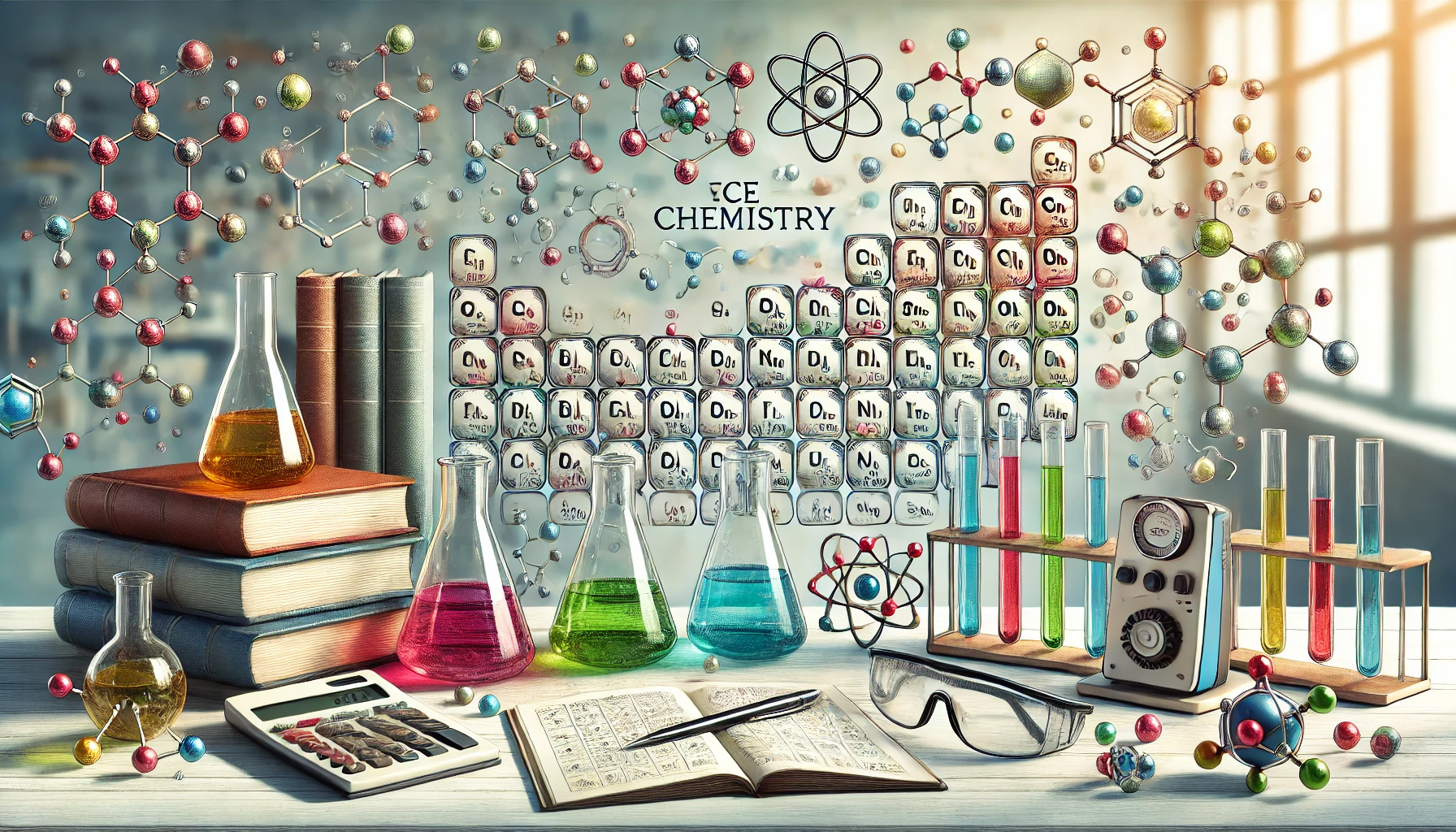
VCE Chemistry is a fascinating and rigorous subject that explores the composition, properties, and transformations of matter at the atomic and molecular level. From chemical reactions and bonding to analytical techniques and organic synthesis, Chemistry equips students with the foundational knowledge and inquiry skills essential for science and health-related university pathways.
What topics are covered in VCE Chemistry?
VCE Chemistry is organised into four units across Years 11 and 12. The curriculum builds from the fundamental structure and properties of matter to advanced applications such as organic synthesis and analytical techniques. Each unit integrates both key knowledge and science skills.
Units 1 & 2 (Year 11)
Unit 1: How can the diversity of materials be explained?
- Atomic structure and periodicity
- Ionic and covalent bonding
- Intermolecular forces
- Properties and uses of metals and nanomaterials
- Polymers and molecular materials
- Experimental investigations of physical and chemical properties
Unit 2: How do chemical reactions shape the natural world?
- Types of chemical reactions
- Balancing equations and stoichiometry
- Energy changes in reactions (endothermic and exothermic)
- Acids and bases
- Green chemistry and sustainability
- Student-designed scientific investigation
Units 3 & 4 (Year 12)
Unit 3: How can chemical processes be designed to optimise efficiency?
- Thermochemistry and calorimetry
- Reaction rates and equilibrium
- The equilibrium law and Le Chatelier’s Principle
- Electrochemical and galvanic cells
- Electrolysis and fuel cells
- Analytical techniques including spectroscopy and chromatography
Unit 4: How are organic compounds categorised, analysed and used?
- Structure and nomenclature of organic compounds
- Reactions of organic compounds and reaction pathways
- Spectroscopic analysis (e.g. NMR, IR, MS)
- Analysis of food molecules (proteins, carbohydrates, lipids)
- Energy content of food and fuels
- Student-designed practical investigation
Each unit is designed to develop both conceptual understanding and practical competence, ensuring students are well-prepared for both assessment and real-world application.
Why study VCE Chemistry?
VCE Chemistry opens the door to a wide range of university courses and careers in health, science, engineering, and technology. It is particularly important for students interested in studying medicine, pharmacy, biomedical science, dentistry, veterinary science, chemical engineering, or environmental science, as Chemistry is often listed as a prerequisite or assumed knowledge for these degrees at Australian universities.
Beyond university entry, Chemistry builds valuable skills such as problem-solving, quantitative reasoning, and scientific communication. It also fosters critical thinking through the analysis of data and the evaluation of experimental results. Students gain experience working in a laboratory setting, which is highly relevant for both further study and industry.
In a broader sense, studying Chemistry helps students understand how substances interact in the world around them—from how medications work in the body to how pollutants affect ecosystems—making it a highly relevant subject for informed global citizens.
💡Ace your VCE Chemistry by learning the insights from the 2024 Examiner’s Report here!

Are there any prerequisites for VCE Chemistry?
There are no formal prerequisites required by VCAA to enrol in Units 1 and 2 of VCE Chemistry. However, a strong foundation in Year 10 Science and Mathematics is highly recommended. Topics such as atoms, chemical reactions, and basic algebra play a key role in understanding the more advanced content covered in the VCE course.
To enrol in Units 3 and 4, VCAA does not mandate completion of Units 1 and 2. However, most schools strongly advise students to complete both Units 1 and 2 before progressing to Year 12 Chemistry. Without the foundational knowledge from Unit 1 (e.g. atomic structure, bonding, and materials) and Unit 2 (e.g. stoichiometry and acids/bases), students are likely to struggle with the more complex analytical and organic chemistry topics in Units 3 and 4.
What skills or capabilities are required to do VCE Chemistry?
VCE Chemistry requires a balance of theoretical understanding, mathematical fluency, and practical investigation skills. Students who succeed in this subject typically demonstrate the following capabilities:
- Strong mathematical skills
- Confident with ratios, algebraic manipulation, and scientific notation.
- Able to apply stoichiometry, calculate concentrations, and analyse energy changes.
- Analytical and problem-solving abilities
- Interpret complex questions, work through multi-step calculations, and apply chemistry principles in unfamiliar contexts.
- Scientific literacy
- Understand and accurately use scientific vocabulary, including chemical symbols and equations.
- Communicate explanations logically using appropriate structure and terminology.
- Laboratory competence
- Confident in planning and conducting experiments, collecting and analysing data, and evaluating the reliability and accuracy of results.
- Attention to detail
- Careful with units, significant figures, and balancing equations—small errors can lead to significant mark loss.
- Curiosity and persistence
- Willing to revisit concepts and work through challenging theoretical or mathematical problems over time.
What type of students should do VCE Chemistry?
VCE Chemistry is ideal for students who are interested in understanding the science behind how substances interact, change, and impact the world around us. It’s particularly suitable for students who:
- Plan to study health or science-related courses at university, such as medicine, pharmacy, biomedical science, dentistry, nursing, or engineering—many of which list Chemistry as a prerequisite or recommended subject.
- Enjoy solving problems and working with formulas and equations, such as balancing chemical reactions or calculating enthalpy changes.
- Are curious about the real-world applications of science, including how fuels are developed, how medicines work, and how food is analysed at the molecular level.
- Have a strong interest in practical lab work, as Chemistry includes numerous hands-on investigations and an independent research project in Unit 4.
- Can manage a content-heavy subject that combines theory, calculations, and conceptual understanding.

How is VCE Chemistry assessed?
VCE Chemistry assessment is made up of a combination of school-based assessments and an externally assessed end-of-year exam. These assessments are designed to evaluate both your understanding of chemical theory and your ability to apply scientific inquiry skills.
Units 1 & 2 (Year 11)
Assessment is school-based and includes:
- Topic tests
- Practical reports and logbooks
- Data analysis tasks
- Extended response and short-answer questions
- A student-designed scientific investigation (Unit 2)
Each school designs its own tasks but must assess both key knowledge and science skills outlined in the study design.
Units 3 & 4 (Year 12)
These contribute directly to your final VCE study score. The breakdown is as follows:
School-Assessed Coursework (SACs)
Tasks in Units 3 and 4 assess:
- Analysis and evaluation of primary and/or secondary data
- Extended practical investigations
- Problem-solving and application of chemical concepts to real-world scenarios
- Structured questions that test understanding of key principles like equilibrium, thermodynamics, and organic chemistry
In Unit 4, students also complete a student-designed practical investigation, which involves planning, conducting, analysing, and evaluating an experiment.
End-of-Year Exam
- Duration: 2.5 hours
- Format: A mix of multiple-choice, short-answer, and extended-response questions
- Content: Covers material from both Units 3 and 4, including theoretical concepts, data interpretation, and practical applications
What are examiners looking for?
Examiners assess:
- Precise chemical terminology and clear scientific communication
- Accurate application of chemical equations, formulas, and calculations
- Logical problem-solving and structured reasoning
- The ability to interpret data and experimental results
- Understanding of how chemical concepts relate to real-world systems
Students who can integrate theoretical knowledge with analytical thinking—and communicate their responses clearly—are best positioned for high performance.
💡Get some tips from one of our tutors who scored a 50 in VCE Chemistry!
Tips to succeed in VCE Chemistry
VCE Chemistry can be challenging, but with the right strategies, students can build both confidence and strong results. Here are practical, subject-specific tips to help you succeed:
1. Master the foundational concepts early
Chemistry is highly cumulative. Topics like mole calculations, chemical equations, and bonding form the basis for Units 3 and 4 content. Make sure you:
- Understand the mole concept and stoichiometry inside out.
- Can confidently name compounds, predict products, and write balanced chemical equations.
2. Don’t just memorise—understand
While some facts need to be learned, deep understanding is key to solving unfamiliar problems. Focus on:
- Why reactions occur (e.g. using collision theory and Le Chatelier’s Principle).
- How structure influences reactivity, especially in organic chemistry.
3. Practise multi-step calculations
Calculations involving equilibrium constants, enthalpy, and titration analysis can span several steps. To prepare:
- Show all working with correct units and significant figures.
- Use VCAA formula sheets often to avoid reliance on memory.
- Do a variety of practice questions to recognise patterns.
4. Get comfortable with data analysis
You’ll frequently encounter questions involving graphs, spectra, or tables—especially in spectroscopy, calorimetry, and chromatography. Practise:
- Interpreting IR, NMR, and MS spectra.
- Drawing conclusions from experimental data.
- Identifying sources of error in practical contexts.
5. Revise actively and consistently
Cramming is not effective for Chemistry. Instead:
- Use active recall with flashcards and concept maps.
- Create a formula sheet with worked examples for regular review.
- Use VCAA past exams and check examiner reports to identify how marks are awarded.
6. Take your practical work seriously
Practical SACs and the Unit 4 investigation carry substantial weight. Keep:
- A detailed and accurate logbook.
- Notes on experimental design, errors, variables, and improvements.
- Copies of past experiments to refer to when designing your own.

What are the most common mistakes VCE Chemistry students make?
Even high-performing students in VCE Chemistry can lose marks due to avoidable errors. Here are the most frequent mistakes—and how to avoid them:
1. Misusing chemical terminology
Students often confuse key terms or use them too loosely in written responses. For example:
- Mixing up enthalpy, activation energy, and bond energy
- Using “reaction is completed” instead of “equilibrium is established”
Tip: Learn definitions word-for-word and practise using them in context. VCAA values precision.
2. Neglecting significant figures and units
Marks are routinely lost for:
- Incorrect or inconsistent significant figures in calculations
- Omitting units like kJ mol⁻¹ or mol L⁻¹
Tip: Follow the number of significant figures provided in the question and double-check all final answers for appropriate units.
3. Relying on memorisation without understanding
Some students memorise steps for calculations or theory without grasping underlying principles, making it hard to apply concepts in new situations.
Tip: Focus on understanding why a reaction shifts in equilibrium, how redox reactions transfer electrons, or what a chromatogram tells you about compound separation.
4. Overlooking practical investigation preparation
The Unit 4 investigation is often rushed or underestimated. Mistakes include:
- Poor planning of experimental method
- Incomplete data collection
- Weak evaluation or analysis
Tip: Treat your logbook as a key assessment document and allocate enough time to design, trial, and refine your investigation.
5. Skipping past exams or misreading questions
Chemistry questions are often layered. Common mistakes include:
- Ignoring command terms like “justify” or “evaluate”
- Answering with rote-learned content rather than what the question actually asks
Tip: Regularly practise with past VCAA exams and mark your work using examiner reports to learn what earns full marks.
Conclusion
VCE Chemistry is a demanding yet rewarding subject that builds essential skills for university and beyond. From mastering chemical reactions to interpreting real-world data, it equips students with a deep understanding of the material world and the ability to think critically and scientifically. Whether you’re aiming for a career in health, science, or engineering—or simply want to challenge yourself academically—Chemistry is a smart and strategic VCE choice.
If you’re looking for expert support, Apex Tuition Australia offers specialised VCE Chemistry tutoring to help you build confidence, improve your results, and reach your academic goals.








